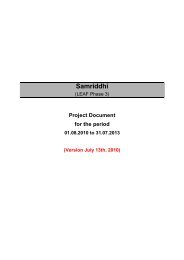Coorperation Strategy - Albania 2010-2013 - Deza - CH
Coorperation Strategy - Albania 2010-2013 - Deza - CH
Coorperation Strategy - Albania 2010-2013 - Deza - CH
Create successful ePaper yourself
Turn your PDF publications into a flip-book with our unique Google optimized e-Paper software.
SWISS COOPERATION<br />
3. Strategic Orientation <strong>2010</strong>–<strong>2013</strong><br />
3.1 Rationale for Swiss<br />
cooperation with <strong>Albania</strong><br />
Swiss cooperation with <strong>Albania</strong> is based on a<br />
variety of motivations:<br />
• Switzerland’s foreign policy has an interest in<br />
political and economic stability and prosperity<br />
in the region of the Western Balkans. In order<br />
to support the transition towards democracy<br />
and prosperity, Switzerland focuses on five<br />
priority countries in the region, among them<br />
<strong>Albania</strong> 8 .<br />
• <strong>Albania</strong>’s transition agenda towards a democratic<br />
and prosperous country is incomplete<br />
and continues to depend on foreign support to<br />
which Switzerland contributes.<br />
• <strong>Albania</strong> assumes an important role in the stability<br />
of a region which continues to adhere to<br />
a prevalently nationalistic conception of the<br />
state as an ethnically homogenous community,<br />
as demonstrated by its moderate role in the<br />
handling of the “<strong>Albania</strong>n question” 9 . <strong>Albania</strong><br />
is also an alleged hub for organised crime<br />
(trafficking in human beings and drugs). This<br />
problem must be counteracted in conjunction<br />
with the improvement of economic and social<br />
conditions, the provision of attractive perspectives<br />
for youth, and the development of good<br />
governance practices.<br />
• Swiss cooperation has an increased potential<br />
for success by using the political will of <strong>Albania</strong><br />
and the related dynamics towards its integration<br />
into the EU.<br />
• Swiss cooperation with <strong>Albania</strong> concentrates<br />
on areas where Switzerland has specific knowledge<br />
and comparative advantages such as in<br />
VET (inspired by the Swiss dual education system),<br />
in mechanisms of decentralisation, risk<br />
insurance and energy.<br />
In the new strategy period, Switzerland will<br />
sharpen the thematic focus of its portfolio in <strong>Albania</strong>.<br />
The activities will concentrate on two domains:<br />
Democratisation and Rule of Law and Economic<br />
Development 10 . The new strategy builds<br />
on the achievements of the last period and further<br />
invests in improving effectiveness and efficiency<br />
with special attention given to sustainability through<br />
a programme approach and the use of synergies<br />
between SDC and SECO. This will enhance the<br />
visibility of the Swiss cooperation in <strong>Albania</strong>.<br />
While the strategy has elements of continuity, it is<br />
designed to adjust to the emerging challenges resulting<br />
from both the global financial crisis and<br />
from any other yet unforeseen dynamics.<br />
3.2 Vision and overall<br />
strategic goal<br />
<strong>Albania</strong>’s vision, according to NSDI 2007–<strong>2013</strong>,<br />
is to be “a country with high living standards,<br />
which is integrated in the European and Euro-Atlantic<br />
structures, is democratic and guarantees the<br />
fundamental human rights and liberties” 11 . In order<br />
to achieve this aim, three pillars have been<br />
defined together with a set of goals for <strong>2013</strong>.<br />
These form the strategic objectives for each sector<br />
along with the crosscutting sector. The monitoring<br />
12<br />
8<br />
The other priority countries in the Western Balkans are:<br />
Bosnia and Herzegovina, Macedonia, Serbia and Kosovo.<br />
9<br />
The number of ethnic <strong>Albania</strong>ns in the neighbouring<br />
countries of Serbia, Kosovo, Montenegro, Macedonia and<br />
Greece equals the number of inhabitants in <strong>Albania</strong>.<br />
10<br />
See visualisation of Cooperation <strong>Strategy</strong> <strong>2010</strong>–<strong>2013</strong><br />
in Annex 1.<br />
11<br />
NSDI 2007–<strong>2013</strong>, page 14, chapter 2 “Vision, strategic<br />
priorities and goals”.

















